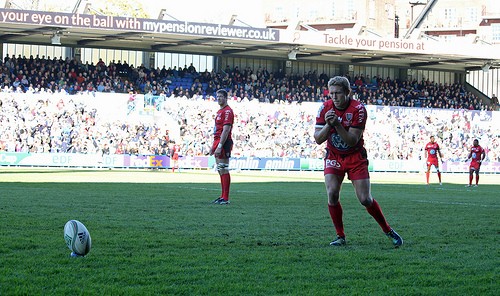Evergreen Wilkinson is still a force
On 22 November, it will be exactly ten years since Sir Clive Woodward’s England became the first team from the northern hemisphere to win the Rugby World Cup.
Since that dramatic night in Sydney, many of England’s heroes have retired and gone on to new careers.
Martin Johnson, the victorious captain, became England coach between 2008 and 2011, whilst others such as Lawrence Dallaglio and Will Greenwood have become television pundits and newspaper columnists.
Not everyone, however, has given up the game.
Almost a decade after his magical drop-goal secured England the ultimate prize in rugby, Jonny Wilkinson is showing spectators why he is still one of the greatest fly-halves of all time.
Now plying his trade in the sunny climes of Toulon, Wilkinson was recently named the European Player of the Year after his characteristically tenacious displays helped the French club to a maiden success in the Heineken Cup.
Throughout the knockout stages of this year’s competition, the English fly-half kept an immaculate kicking record as he scored with all 17 of his place kicks, amassing an impressive 108 points throughout the tournament.
It is not only Wilkinson’s well-known ability with the boot, however, that has seen him recognised as the best in Europe and worshipped as a god on the French south coast.
His ferocity in defence was such a key aspect of Toulon’s Heineken Cup final victory over Clermont, whilst his ability to read and manage the game so well from such a pivotal position on the field proved important throughout the competition.
Of course, we should not be surprised by the 2003 BBC Sport Personality of the Year award winner’s success in France: winning has been a part of his DNA for a long time.
Wilkinson’s abilities have been there for all to see since he broke into the England set up in the late 1990s, becoming one of the key members of the team that conquered all before them at the beginning of the millennium.
As well as his match-winning performance in the World Cup final, he produced some influential moments in an England shirt throughout his international career.
Highlights include the 42-6 victory over Ireland that secured the Grand Slam in 2003 and another virtuoso kicking display against the Aussies in Marseilles to secure England a semi-final berth in the 2007 World Cup.
A quick look at the numbers tells the full story of Wilkinson’s legacy in international rugby.
The Surrey-born fly half amassed an incredible 1,179 points for England in the 91 Tests that he played for them, helping the side to 67 victories throughout that time.
He also holds the record for points scored by an individual in World Cups, the 277 that he scored standing as a massive 50 more than any other player in history. Only Dan Carter remains above him as the all-time top international points scorer.
Continued success with England resulted in his selection for successive Lions tours, to Australia in 2001 and New Zealand in 2005, where he once again proved his calibre as a formidable opponent for the world’s best teams, cutting defences apart and keeping the opposition at bay with his fierce tackling.
His recent decision to omit himself from the Lions squad travelling to Australia this summer shocked many commentators, but Wilkinson appeared to wish for younger players to get the opportunity, instead deciding to focus his efforts on Toulon’s domestic title challenge.
Wilkinson’s choice once again seemed to reiterate his humble nature, a characteristic that has always been so well documented in spite of his wish to shy away from the limelight.
The Surrey-born fly half amassed an incredible 1,179 points for England in the 91 Tests that he played for them, helping the side to 67 victories throughout that time
All of that is not to say that coach Warren Gatland won’t call him up in the near future, and given Owen Farrell’s recent poor displays, it seems an inevitability that Wilko will once again pull on the red jersey of the Lions.
Despite all of the hype over his playing ability and his manner off the pitch, perhaps the most notable aspect of Wilkinson’s greatness is his resilience.
Over his 15-year career, the fly-half has been continually plagued by serious injuries, including problems with his shoulder, knees and ankle.
Such problems ensured that he didn’t play for England for over three years after his 2003 World Cup success and stifled his chances of gaining domestic success during his time at Newcastle Falcons.
Nonetheless, he has come back from every knock with the unfaltering determination that Wilkinson personifies, remaining the model professional throughout all of the disappointments and setbacks.
Jonny failed in his bid to secure Toulon a historic double of domestic and European trophies, after a surprising 19-14 defeat by Castres in the final of the French Top 14.
But do not be surprised to see him boarding a Qantas flight for Australia at the very last minute, where he may yet join a select club of three-tour Lions.
Whilst doubts remain over the temperament of 21-year-old Farrell, and the threat of injury continues to hang over Ireland’s fly-half Jonathan Sexton, it would be no surprise to see Gatland give Wilkinson an SOS call.
And despite his insistence to the contrary, Wilkinson is as dependable a character as he is a kicker – he would never let British rugby down in a time of genuine need.
If all of this comes true, it would add another compelling chapter to a legendary tale of one of rugby’s finest.

Comments